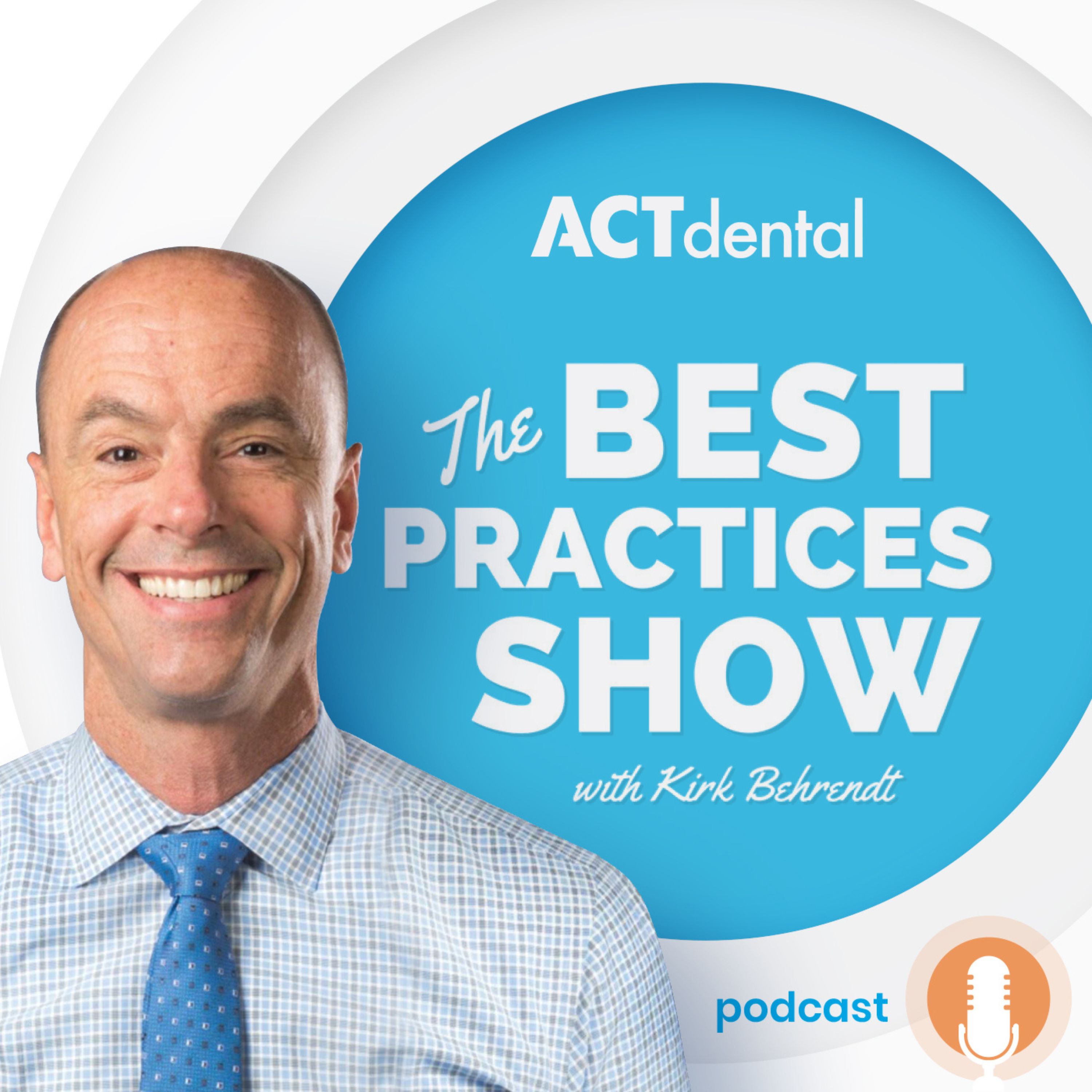Episode 489
489: Reinfection Rates & What You Need to Know - Dr. John Molinari
489: Reinfection Rates & What You Need to Know - Dr. John Molinari
Dentistry has a history with infection control. It has become better and safer because of it, and we can do it again for COVID-19. And to encourage keeping your practice and patients safe, Kirk Behrendt brings in Dr. John Molinari, expert on infection control and co-author of Cottone’s Practical Infection Control in Dentistry. He explains everything you need to know about reinfection rates and what you can do to keep your community healthy. Don't let your guard down against reinfection! For more advice from the expert, listen to Episode 489 of The Best Practices Show!
Episode Resources:
- Dr. Molinari’s email: johnmolinariphd@gmail.com
- Subscribe to the Best Practices Show Podcast
- Join the To The Top Study Club
- See our Live Events Schedule here
- Get the Best Practices Magazine for Free!
- Write a Review on iTunes
Main Takeaways:
COVID-19 is here to stay.
Vaccines alone will not prevent reinfection.
Practice the proven methods of infection control.
There are many more cases than what's reported.
Stay positive. Advancements are being made quickly.
Quotes:
“[COVID-19 is] not going to go away. I hate to say that. People keep saying, ‘Well, you have a vaxxed team for influenza, and we have some of that under control.’ But still, people get the flu even after they get the vaccine. And of course, a lot of people get the flu vaccine. Well, flu vaccine research started in 1940. So, we've had like 80-some-odd years of research with flu vaccines. We only have a little more than two-and-a-half years with SARS-CoV-2. And these coronaviruses do mutate a lot. They change.” (3:52—4:30)
“The good news — the good news first — is that [COVID-19 Omicron] reinfections with this tend to be milder, especially if you're vaccinated. So, that's good, which is what these [vaccines] were designed to do, prevent severe illness, hospitalizations, death. But the not-so-good news is this thing continues to adapt and mutate where now we have BA.4, BA.5, which are predominant in the U.S. And they can escape our antibodies to a certain extent.” (4:37—5:05)
“[COVID-19] antibodies can protect, but not like a hepatitis B immunity or a measles immunity or something like that, which is more stable. And so, you have people who could get reinfected, especially if they had a mild infection the first time where they didn't produce a lot of antibodies. This virus is really — I hate to give it a human characteristic, but it’s very smart. It can adapt and change very readily. The good news is that the most recent mutations appear to present with milder infections, especially for those who are vaccinated. The unvaccinated continue to be much more severe in hospitalizations.” (5:06—5:52)
“I will tell you one exciting thing that I think is on the horizon. And I don't have a crystal ball, but there are clinical trials, including in this country, on what's called a pan-coronavirus vaccine where they actually are taking antigens from different coronavirus strains, not just SARS-CoV-2, and trying to find stabilized antigens so that they can induce a broader immune response with this pan-coronavirus vaccine down the road, which will not only protect against what's out there, but will also help protect against the emerging stuff down the road.” (6:26—7:08)
“One of the themes I hear is, ‘I'm really tired of this crap. We’re okay. We got vaccinated. We got boosted. These are expensive. This is expensive. What can I do?’ So, they're not necessarily following what they were doing during the peak of the pandemic. What they need to realize is this is part of the new infection control, just like gloves were in the ‘80s for them. Respirators protect against a number of things, and not just this — especially if you have people with mild infections or who are asymptomatic who have a positive home test but don't report it, which is very, very common. There are many more cases than are being reported, so [dentists] need to keep doing what they’ve already been shown that they can do and practice the appropriate infection control. I worry about that.” (7:45—8:42)
“I think that it’s going to get better. Science is going to continue to evolve to look for vaccines. We already have good drugs out there which protect against severe infection. We even have things like Paxlovid, which can be prophylactic for people who are compromised. So, we have some good things out there. That was why the death rate went down so low. Our hospital heroes really have more in their armamentarium, and we’re learning more about this all the time. What's also nice is you have a worldwide effort. It’s not just the U.S. and Canada or Great Britain. There are countries that are really devoting a lot of time to studying this and coming up with advances which we can take advantage of as well.” (9:20—10:06)
“[COVID-19] is not going to go away. It’s not going to go away. And dentistry needs to continue to respond like they did. And I know they can.” (10:08—10:18)
“[Advancements are] moving as fast as it can. There have been some missteps because the virus continues to surprise, at times. And it doesn't happen with all viruses. It happens to happen with coronaviruses and this one, in particular, really became much more aggressive. And we’re dealing with a virus that is able to mutate fairly readily. I remember seeing about a year ago now, some report came out of Europe that suggested that SARS-CoV-2 had mutated 12,000 times since the beginning of the pandemic. But you don't see that with measles or hepatitis or mumps, or even smallpox or polio. The vaccines are going to get better. That's a big effort.” (10:51—11:41)
“Certain viruses are very adaptable, especially respiratory viruses. We lucked out, to a certain extent, with measles and things like that, which haven't really changed very much. But we also have a very aggressive vaccination program where we have the overwhelming majority of the population protected for a long period of time. We didn't get that with COVID-19. There was too much division, if you will. And I'll just leave it at that. And so, the virus has continued to gain a foothold.” (13:42—14:14)
“I think people need to start to get over the fact that, ‘We’re never going to do this! Science has failed us! The CDC is in the government’s pocket!’ That sort of stuff is nonsense. But it takes time. And we only have two-and-a-half years of experience with this virus, versus what we have for hep B and influenza and measles and stuff like that, even smallpox.” (15:57—16:19)
“Dentistry has responded to challenges . . . I can remember when we introduced gloves in our school in 1980. Our hygiene department wanted it. Oh my god, the dentists went crazy. But dentistry responded, and they responded well. So, there's a history there with infection control. And dentistry has gotten so much better and safer. And this is another step as we have another challenge. So, dentistry has already been asked to do it.” (16:41—17:18)
“There have been advances. It’s based on science. It’s based on clinical evidence. It’s based on applications of it. Do what's appropriate. Protect yourselves, protect your staff, protect your families.” (18:39—18:50)
“You and I remember when dentists and other health professionals didn't want to treat AIDS patients. And then, they realized that they were seeing them without even realizing it. And then, that brought in the standard precautions. And so, it takes time. But I think dentistry has had a good start in this, and I think they want to do the right things — not I think, I know they want to do the right things. I don't know of anybody who went into dentistry not to help people.” (18:55—19:24)
“You have to do what the evidence shows. And the evidence has continued to evolve. We’re going to get better.” (19:28—19:33)
“We've come a long way. I'm proud of what dentistry has accomplished. I'm not a dentist, but I worked with dentists most of my adult life, and hygienists and assistants. And I'm proud of what dentistry has accomplished. Don't go backwards. You've done it. Now, it’s part of your armamentarium. Use the right personal protective equipment. Have the right approach. People are being home tested, so we’re seeing a lot of cases that are not even being reported. So, when you see reported numbers, they are way low, way below what's really happening. And understand that. But make sure that you do what you're supposed to do, because the evidence shows that you are protected from that.” (20:20—21:08)
Snippets:
0:00 Introduction.
1:44 Dr. Molinari’s background.
3:16 Why COVID-19 isn't going away.
8:56 Will COVID-19 be part of our entire lives?
10:31 What we need to know about the advancements.
13:15 Lessons to learn from the past.
16:22 Advice for dentists.
20:06 Last thoughts on COVID-19 reinfection rates.
Links Mentioned in This Episode:
Articles by Dr. Molinari in Dental Economics: https://www.dentaleconomics.com/search?filters={%22text%22:%22dr.%20john%20a.%20molinari%22,%22type%22:[],%22websiteSchedule%22:[],%22labels%22:[],%22authors%22:[]}
Articles by Dr. Molinari in JADA: https://jada.ada.org/action/doSearch?text1=dr.+john+a.+molinari&field1=AllField
Cottone’s Practical Infection Control in Dentistry by Dr. John A. Molinari and Dr. Jennifer A. Harte: https://bookshop.org/p/books/cottone-s-practical-infection-control-in-dentistry-john-a-molinari/16414133?ean=9781284220308
Dr. John Molinari Bio:
Dr. John A. Molinari received a B.A. in Biology from St. Vincent College and a Ph.D. in Microbiology from the University of Pittsburgh School of Dental Medicine. He was awarded Professor Emeritus at the University of Detroit Mercy, where he served for 32 years in the School of Dentistry as Professor and Chairman of the Department of Biomedical Sciences and Director of Infection Control. He was later Infection Control Director for THE DENTAL ADVISOR in Ann Arbor, Michigan, from 2009 to 2018. He has published over 500 scientific articles, text chapters, and abstracts in the areas of microbiology and immunology, and lectures nationally and internationally on topics dealing with infectious diseases and infection control.
Dr. Molinari is a founder and Past-President of OSAP and is also co-author of the text, Cottone’s Practical Infection Control in Dentistry. He has served as a consultant for the CDC, ADA Council on Scientific Affairs, Council on Dental Practice, and regional hospitals. He also was Chairman of the State of Michigan Governor’s Risk Reduction and AIDS Policy Commission. Previously, he was the Infection Control section editor for The Compendium of Continuing Education in Dentistry, a member of the Editorial Board for The Journal of the American Dental Association, and contributed a monthly column for Dental Economics. In recognition of his efforts, he was inducted as an honorary member of the Michigan Dental Association, the International College of Dentists, the American College of Dentists, and was a recipient of the ADA Golden Apple Award.


